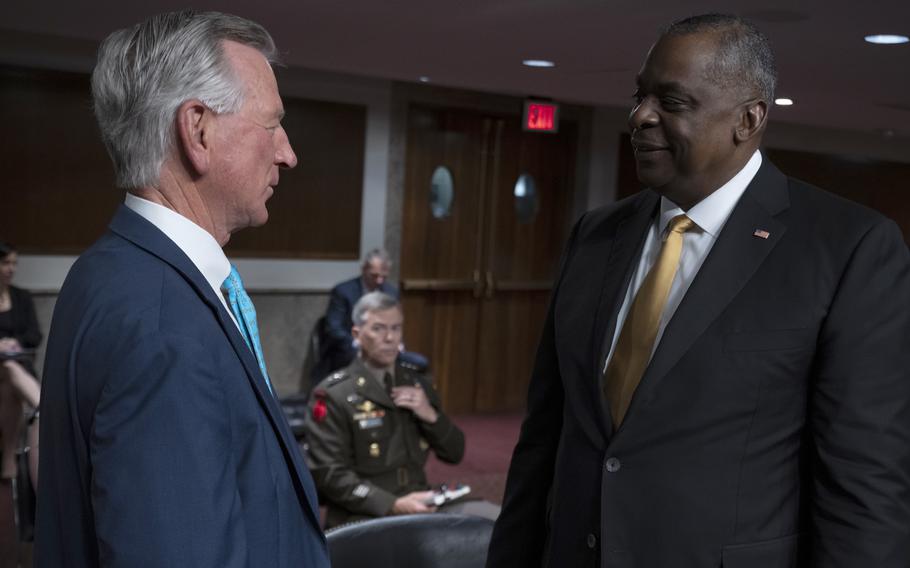
Defense Secretary Lloyd Austin speaks with Sen. Tommy Tuberville, R-Ala., in June 2021 prior to appearing before the Senate Armed Services Committee for a Defense Department budget review. (Chad J. McNeeley/Defense Department)
WASHINGTON — Defense Secretary Lloyd Austin is predicting vast ripple effects from a Republican senator’s continued hold on senior military nominations, including “profound confusion and disturbance” for service members and their families.
Austin outlined the increasing risks in a letter to Sen. Elizabeth Warren, D-Mass., who unsuccessfully called for the unanimous confirmation of nearly 200 stalled military officer nominations in late April. The effort was again blocked by Sen. Tommy Tuberville, R-Ala., who has held up promotions for months over his opposition to new Pentagon policies providing access to abortion services.
“Long-term holds have a corrosive and cascading effect: they prevent our rising officers and their families from being able to predict promotion and rotation windows, which can increase the pressure to leave the military in favor of greater stability,” Austin wrote. “The more our normal promotion processes are jolted, the more we risk the loss of the diverse warfighting and technical expertise that America needs to confront its 21st-century security challenges.”
The list of officers caught up in the blockade has grown to include 64 three- and four-star admirals and generals for positions such as the Army chief of staff, the chief of naval operations, the commandant and assistant commandant of the Marine Corps, commander of U.S. Northern Command, commander of U.S. Cyber Command and director of the National Security Agency. The positions are due to rotate within the next 120 days, Austin wrote.
Another 80 three- and four-star positions are expected to come up for rotation in the next nine months, including the chairman of the Joint Chiefs of Staff, the vice chief of staff of the Army and the vice chief of staff of the Air Force. The Defense Department anticipates sending about 650 general and flag officer nominees for Senate confirmation through the end of the year, Austin wrote.
The Senate typically approves military promotions all at once by a unanimous consent vote but Tuberville’s obstruction would require the upper chamber to vote on each one by one, a process that would consume months of floor time.
“Ultimately, the breakdown of the normal flow of leadership across the department’s carefully cultivated promotion and transition system will breed uncertainty and confusion across the U.S. military,” Austin wrote.
The impact will be felt not just by the military’s most senior officers but also by rising one- and two-star general and flag officers, he wrote. Extended holds could delay promotion timelines for groups behind the current cadre of officers by one to two years, according to Austin.
Tuberville’s hold also introduces a new layer of stress for families planning permanent change-of-station moves. Austin said those moves will need to be delayed or canceled if the senator refuses to lift his objection, and military children will not be able to move to new schools in time for the next school year.
Military spouses might not be able to accept or start new jobs due to the uncertainty, and services for family members with special needs could be subject to serious delays, he said.
“The current hold imposes additional burdens upon our military families that are both unnecessary and unconscionable,” Austin wrote.
The defense secretary warned the consequences of the hold are far-reaching and will grow more dire the longer it persists.
Failing to fill key roles in the National Security Agency and Cyber Command, for example, will weaken U.S. cybersecurity at a moment when the nation’s adversaries are eying new domains of potential conflict, Austin said.
The hold also makes it more difficult for the U.S. to fulfill its global leadership responsibilities and diminishes the military’s reputation as the strongest in the world, he said. Much of that standing is based on America’s stable processes and orderly transitions, Austin said.
“The full impact of this hold may not be immediately noticeable because of the resilience built into our military organizations, but over time, the hold will cause cascading impacts to our readiness and needlessly hinder our ability to meet our strategic objectives in the Indo-Pacific, Europe, the Middle East and beyond,” he wrote.
Joint exercises with partners, such as Balikatan with the Philippines or U.S.-Israeli naval activity in the Bab el-Mandeb Strait, could become more difficult if confirmation delays force other leaders to take on the responsibilities of officers held up by the Senate, Austin wrote.
“The failure to confirm leaders in key roles transfers strategic risk down the chain of command and forces our units to operate with less experienced decision-makers in charge,” he wrote. “By destabilizing the senior military promotion and rotation process, we put our short- and long-term readiness at significant risk.”
Tuberville has shown no signs of backing down from his objections and continues to demand the Pentagon rescind policies that provide leave and travel reimbursement for service members seeking reproductive health care. Sen. Mike Lee, R-Utah, joined the obstruction last month.
Austin’s letter to Warren follows similar warnings from seven former defense secretaries last week who told Senate leaders that they feared damage to U.S. national security.
Sen. Jack Reed, D-R.I., the chairman of the Senate Armed Services Committee, said in a statement Wednesday that senators will continue to fight for troops until the “irresponsible” blockade ends.
“The overwhelming majority of Americans disagree with these Republican tactics that are hurting hundreds of military families,” he said.